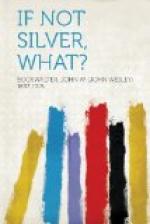The silent and insidious increase of their obligations, by reason of the enhanced and steadily enhancing value of gold, has ruined many thousands of business men who are even now unconscious of the real cause or of the power that has destroyed them.
I may add in this connection that the three per cent. now paid on a United States bond is worth about as much in commodities as the six per cent. paid previous to 1870, and at the same time the bond has doubled in value for the same reason; thus, calculated on the basis of twenty-five years, the bondholder is really receiving, or has received, the equivalent of ten per cent. interest.
DEMONETIZATION OF GOLD.
Gold has an intrinsic value, says the monometallist, which makes it the money of the world. It is sound and stable, while silver fluctuates. See how much more silver an ounce of gold will buy than in 1873, but the gold dollar remains the same, worth its face as bullion anywhere in the world.
But suppose there had been a general demonetization of gold instead of silver, how would the ratio have stood then? Would not the same reasoning prove silver unchangeable, and gold the fluctuating metal?
Oh, nonsense! it is impossible to demonetize gold, because the civilized world recognizes it as an invariable standard by which all commodities are measured in value. The supposition is absurd. It would be very much like deoxygenizing the air.
But, my dear sir, gold has been demonetized, and not very long ago, either, and very extensively, too. It was deprived of its legal tender quality by four great nations, comprising some seventy million people; demonetized because it was cheap and because the world’s creditors believed it was going to be cheaper; the demonetization, so far as it went, produced enormous evils, and nothing but the firmness of France and the far-seeing wisdom of her financiers prevented the demonetization becoming general on the continent of Europe, which would have reversed the present position of the two metals in the public mind.




